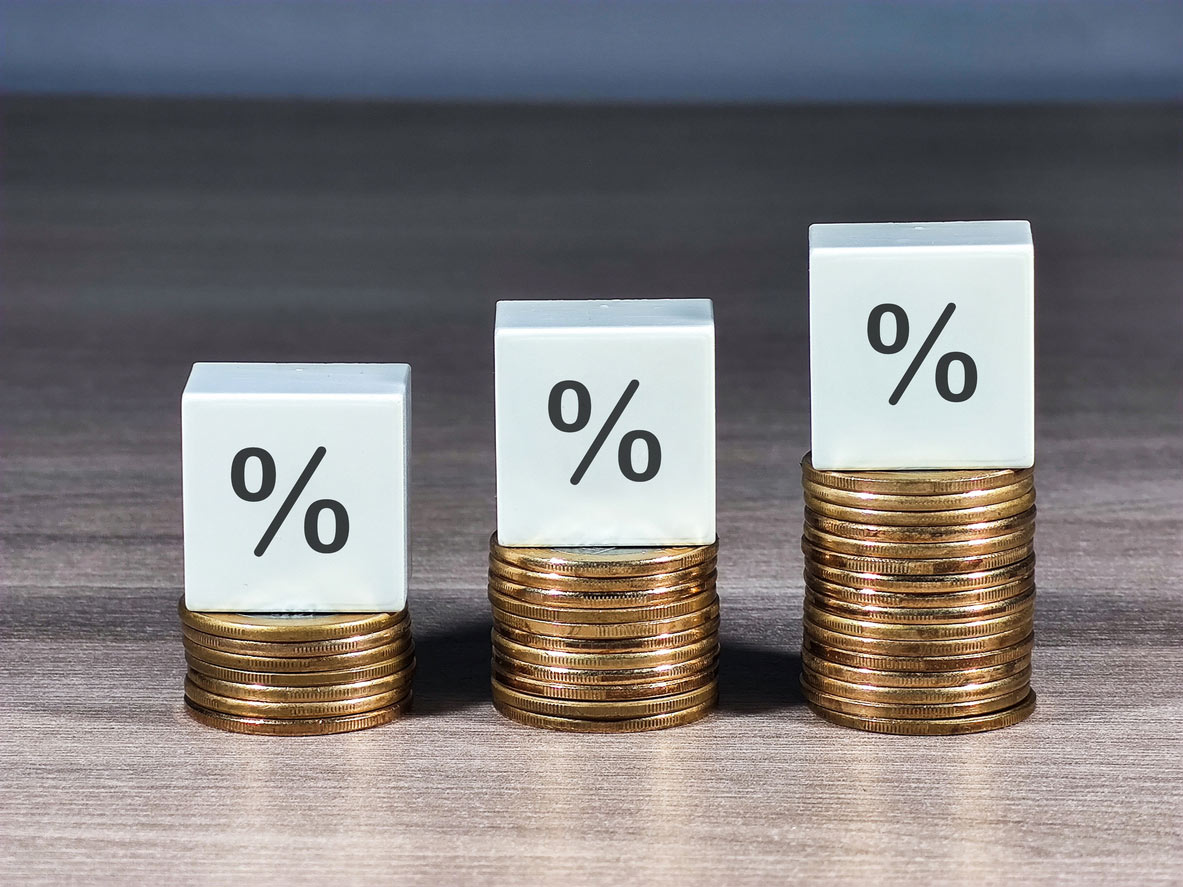Since the start of 2022, interest rates have been on the rise due to consistent rate hikes by the Federal Reserve. These rate hikes tend to affect the market, which is why investors should be aware of what rising interest rates typically mean. In this article, you’ll learn about rising interest rates and what they mean for the stock market.
iStock.com/Alison Calazans
What Are Interest Rates?
- Interest rates are the total amount that a lender will charge for people or institutions that borrow money. Lenders charge interest rates to lower their risk of lending money. When an individual or company is considered to be a higher risk, it’s likely that the lender will charge a higher interest rate.
- Banks will also charge interest for money that’s lent to banks and financial institutions. This is referred to as the federal funds rate, which serves as the basis for the interest rates that individuals and consumers must pay. If it costs more for banks to borrow money, it will cost more for consumers to borrow money from these banks.
How Does the Fed Funds Rate Work?
The Federal Reserve’s primary goal is to keep inflation at a level of 2-3%. In October 2022, inflation is at just over 8%, which indicates that inflation is far higher than the Federal Reserve would like it to be. When inflation is at 2-3%, it’s believed that wages will rise, unemployment levels will be low, and the economy will grow. However, outside influences tend to cause inflation to drop below or rise higher than the preferred target.
At the moment, inflation is exceedingly high as a result of supply chain problems, monetary policy issues derived from the COVID-19 pandemic, and wage growth. A similar period of inflation occurred throughout the 1980s. At that time, monetary policy problems, high unemployment levels, and an ongoing oil crisis were the primary reasons for inflation.
In the event that inflation rises above the target range, it’s common for the Federal Reserve to increase interest rates in the hope that inflation will drop. In this scenario, it becomes more difficult for businesses to borrow money, which results in the economy slowing down by a considerable amount. Individual borrowers will also borrow less because of higher interest rates. Over an extended period of time, inflation should begin to drop because of these actions.
At times when inflation is below the aforementioned target range, it’s possible for the Federal Reserve to decrease interest rates, which results in quicker growth, more hiring, and a larger increase in wages. Companies tend to produce more products when people have money to spend, which fosters growth in the economy.
What Occurs When Interest Rates Increase?
When interest rates rise because of the increase to the fed funds rate by the Federal Reserve, short-term borrowing expenses become much higher for banks and other financial institutions. The banks will then charge higher interest rates to individual buyers and companies that are looking to borrow money.
Consumers tend to be impacted the most with higher interest rates on mortgages and credit cards. Loans with variable interest rates can be particularly damaging to a person’s finances in this scenario. Bills must still be paid, which results in households having a lower amount of disposable income.
If consumers don’t spend their money, businesses won’t receive as much revenues, which will also result in profits shrinking. When a business doesn’t earn as much revenues, stock prices for these businesses usually drop considerably. Keep in mind that businesses usually make quarterly forecasts on what they expect their revenues and profits to be at the end of the quarter. If the actual numbers are lower than the forecasts, the company’s value will invariably drop for a short period of time.
What Do Higher Interest Rates Indicate for the Stock Market?
In the majority of situations, higher interest rates usually lead to a decline in the stock market’s value. As mentioned previously, rising interest rates lead to companies borrowing less money as well as slower growth. This particular issue can affect the entire market.
For instance, let’s say that an individual investor decides to purchase shares of a technology stock under the belief that it will grow annually by around 10-12%. In the event that interest rates increase, growth projections could decrease to 5-7%, which makes the investor’s holdings far less valuable than anticipated.
In this scenario, the investor might believe that the risk is too high for lower return, which means that they could decide to place their funds into low-risk bonds. When a large number of investors take this action around the same time, the demand associated with the stock in question will decrease, which results in a drop of the price.
As for the bond market, prices usually increase when more investors place their money into the sector. Yields will also drop. Keep in mind that the overall market worsening doesn’t mean that every single stock will drop in value. Some will perform exceedingly well as a result of the increasing interest rates.
Your goal as an investor should be to examine the entire economy to determine how rising rates are affecting the market and if these effects will change any time soon. Even though the market usually performs worse when interest rates are high, taking the right approach to investing may give you the opportunity to hedge your portfolio against inflation.

